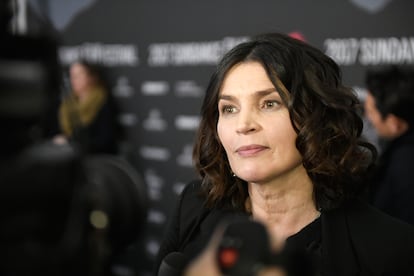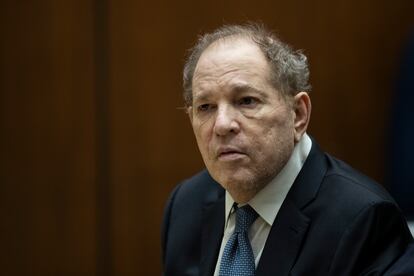Julia Ormond sues Harvey Weinstein for sexually abusing her in 1995
The star of ‘Legends of the Fall’ has also denounced her then representation agency, as well as Miramax, the mogul’s production company, and the Walt Disney Company, which owned it in the 1990s


The fall from grace of once all-powerful film producer Harvey Weinstein, 71, seems to have no end in sight. This Wednesday it emerged that British actress Julia Ormond, 58, has filed a lawsuit against him in New York. Ormond accuses him of several sex crimes that took place in 1995. The man who was behind some of the most important American films of the last half century is sentenced to spend 23 years in a New York prison, which is joined by another sentence for another 16 years in California.
Ormond accuses Weinstein of sexually abusing her after a business dinner in 1995. At the time, the British actress, who was 30 years old, had become a star in her own right. Within a few months, between 1994 and 1995, she had released three films that had launched her to stardom: Legends of the Fall, First Knight and Sabrina. The actress and the producer had met around the same time, at a business meeting in 1994 in London that had been arranged by the actress’s British agent. They then discussed future projects and, according to the lawsuit, “Weinstein acted appropriately during the meeting, and they agreed to stay in contact.” He sent her some scripts, they spoke on the phone, she passed him profuse notes from those scripts and they gradually developed a professional relationship. She began working for Miramax, Weinstein’s film production company, in its New York offices and living in an apartment paid for by the company.
As stated in the lawsuit — published by U.S. media such as Variety and Page Six — after that dinner in December 1995 Weinstein told her that he wanted to talk to her about a possible project, but that he would only do so “back at the apartment Miramax had provided for Ormond as part of their first-look deal with her.” She agreed to let him come to her home, and then, according to the documents, there he forced her to give him a massage, “stripped naked and forced her to perform oral sex on him,” as well as to masturbate him.
According to the lawsuit, when the events occurred Ormond informed her agents, Kevin Huvane and Bryan Lourd (ex-partner of actress Carrie Fisher and father of her daughter, actress Billie Lourd). However, and according to the version of the actress, they warned her that it was not a good idea to take a stand against Weinstein and then did not provide her with protection. As the complaint reads, Huvane and Lourd were aware “of Weinstein’s propensity for sexually assaultive and exploitative behavior, particularly as to young actresses whom Weinstein was meeting for business purposes,” and had “knowledge of confidential settlements that Weinstein reached to keep his conduct hidden from public exposure. But they did not disclose these circumstances to Ormond or otherwise warn her.” Therefore, in addition to Weinstein, Ormond is also suing her then representation agency, the Creative Artists Agency or CAA, which she accuses of negligence and breach of fiduciary duty, i.e., failing her in their responsibility of care while Ormond was their client.

CAA is one of the most important representation agencies in Hollywood, and manages the careers of talents such as Jennifer Aniston, Reese Witherspoon, Daniel Craig, Ana de Armas, Sandra Bullock, Jane Fonda, Eddie Redmayne, Viola Davis or Barbra Streisand, among many others. Already in 2017 The New York Times claimed that they were part of Weinstein’s shill machine, and then they released a statement apologizing “for not meeting the high expectations we place on ourselves, as individuals and as a company.”
In addition, Ormond is also suing Miramax, the production company Harvey Weinstein founded with his brother Bob, and the Walt Disney Company, which owned the production company in the 1990s, in both cases for “negligent supervision and retention.” Huvane and Lourd, now co-presidents of CAA, are not named as defendants but are named in the legal documents, claiming that “the men at CAA who represented Ormond knew about Weinstein. So too did Weinstein’s employers at Miramax and Disney.” “Brazenly, none of these prominent companies warned Ormond that Weinstein had a history of assaulting women because he was too important, too powerful, and made them too much money.” Former Miramax and Disney executives at the time, including its former chairman, Jeffrey Katzenberg, and CEO, Michael Eisner, are also cited, though again not as defendants.
Of course, no project ever came to fruition between Ormond and Weinstein. Their careers would only cross paths again briefly and many years later: in My Week with Marilyn, which in 2011 was produced by The Weinstein Company and in which Ormond had a supporting role. In 1997, after the assault, he wanted to visit her on a shoot in Copenhagen, to which she refused, turned him down, and shortly thereafter her contract with Miramax ended. “Ormond soon felt Weinstein’s wrath,” the lawsuit reads. Her career was never the same again: she was then getting as much as $3.5 million per title, which today with inflation would be more than double. “The damage to Ormond’s career because of Weinstein’s assault and the aftermath was catastrophic both personally and professionally,” the lawsuit says, noting that she has “nearly disappeared from the public eye.” Her friends would call her, suspecting that something had happened.
While Weinstein has been accused and found guilty of various sex crimes by around a hundred women over the last decade, it has not been common to see other companies, his own or associated, accused of collusion or of having covered up the rapes in these lawsuits. From his New York jail cell, the tycoon “categorically denies” Ormond’s accusations through a statement from his lawyer, and affirms that “he is prepared to vehemently defend himself”. “This is yet another example of a complaint filed against Mr. Weinstein after the passing of decades, and he is confident that the evidence will not support Ms. Ormond’s claims,” his counsel asserts.
Ormond has released a statement alongside the lawsuit where she explained that for “decades” she has lived “with the painful memories” caused by Weinstein. “I seek a level of personal closure by holding them accountable to acknowledge their part and the depth of its harms and hope that all of our increased understanding will lead to further protections for all of us at work,” the performer says. She has also assured Variety that she has decided to go public with her story now because she believes that what is needed is “systemic change”, and that ”accountability from enablers” is needed “in order to get there”; telling her story is one way to do that. “Obviously, Harvey Weinstein is in jail and is going to be in jail for a very long time. I personally don’t believe that Harvey could have done this without enablers. And for me, that is the layer that you have to get down to, in terms of the root cause.”
Sign up for our weekly newsletter to get more English-language news coverage from EL PAÍS USA Edition
Tu suscripción se está usando en otro dispositivo
¿Quieres añadir otro usuario a tu suscripción?
Si continúas leyendo en este dispositivo, no se podrá leer en el otro.
FlechaTu suscripción se está usando en otro dispositivo y solo puedes acceder a EL PAÍS desde un dispositivo a la vez.
Si quieres compartir tu cuenta, cambia tu suscripción a la modalidad Premium, así podrás añadir otro usuario. Cada uno accederá con su propia cuenta de email, lo que os permitirá personalizar vuestra experiencia en EL PAÍS.
¿Tienes una suscripción de empresa? Accede aquí para contratar más cuentas.
En el caso de no saber quién está usando tu cuenta, te recomendamos cambiar tu contraseña aquí.
Si decides continuar compartiendo tu cuenta, este mensaje se mostrará en tu dispositivo y en el de la otra persona que está usando tu cuenta de forma indefinida, afectando a tu experiencia de lectura. Puedes consultar aquí los términos y condiciones de la suscripción digital.








































